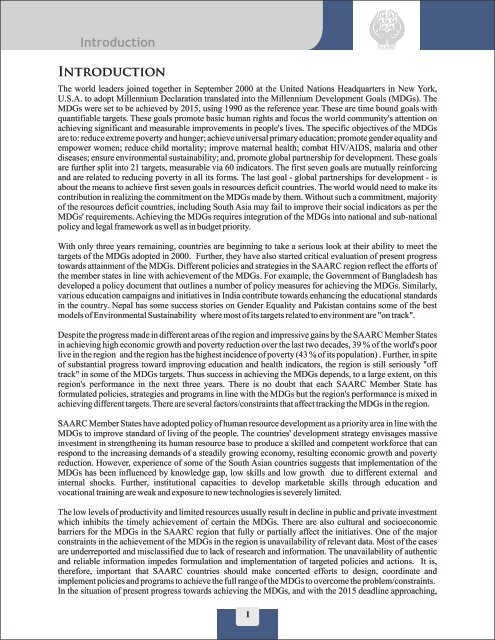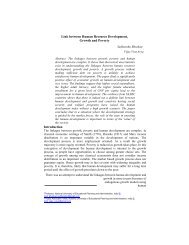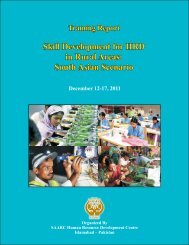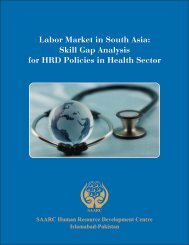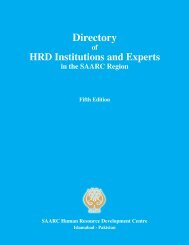Training Report: Millennium Development Goals in the SAARC Region
Training Report: Millennium Development Goals in the SAARC Region
Training Report: Millennium Development Goals in the SAARC Region
You also want an ePaper? Increase the reach of your titles
YUMPU automatically turns print PDFs into web optimized ePapers that Google loves.
Introduction<br />
Introduction<br />
The world leaders jo<strong>in</strong>ed toge<strong>the</strong>r <strong>in</strong> September 2000 at <strong>the</strong> United Nations Headquarters <strong>in</strong> New York,<br />
U.S.A. to adopt <strong>Millennium</strong> Declaration translated <strong>in</strong>to <strong>the</strong> <strong>Millennium</strong> <strong>Development</strong> <strong>Goals</strong> (MDGs). The<br />
MDGs were set to be achieved by 2015, us<strong>in</strong>g 1990 as <strong>the</strong> reference year. These are time bound goals with<br />
quantifiable targets. These goals promote basic human rights and focus <strong>the</strong> world community's attention on<br />
achiev<strong>in</strong>g significant and measurable improvements <strong>in</strong> people's lives. The specific objectives of <strong>the</strong> MDGs<br />
are to: reduce extreme poverty and hunger; achieve universal primary education; promote gender equality and<br />
empower women; reduce child mortality; improve maternal health; combat HIV/AIDS, malaria and o<strong>the</strong>r<br />
diseases; ensure environmental susta<strong>in</strong>ability; and, promote global partnership for development. These goals<br />
are fur<strong>the</strong>r split <strong>in</strong>to 21 targets, measurable via 60 <strong>in</strong>dicators. The first seven goals are mutually re<strong>in</strong>forc<strong>in</strong>g<br />
and are related to reduc<strong>in</strong>g poverty <strong>in</strong> all its forms. The last goal - global partnerships for development - is<br />
about <strong>the</strong> means to achieve first seven goals <strong>in</strong> resources deficit countries. The world would need to make its<br />
contribution <strong>in</strong> realiz<strong>in</strong>g <strong>the</strong> commitment on <strong>the</strong> MDGs made by <strong>the</strong>m. Without such a commitment, majority<br />
of <strong>the</strong> resources deficit countries, <strong>in</strong>clud<strong>in</strong>g South Asia may fail to improve <strong>the</strong>ir social <strong>in</strong>dicators as per <strong>the</strong><br />
MDGs' requirements. Achiev<strong>in</strong>g <strong>the</strong> MDGs requires <strong>in</strong>tegration of <strong>the</strong> MDGs <strong>in</strong>to national and sub-national<br />
policy and legal framework as well as <strong>in</strong> budget priority.<br />
With only three years rema<strong>in</strong><strong>in</strong>g, countries are beg<strong>in</strong>n<strong>in</strong>g to take a serious look at <strong>the</strong>ir ability to meet <strong>the</strong><br />
targets of <strong>the</strong> MDGs adopted <strong>in</strong> 2000. Fur<strong>the</strong>r, <strong>the</strong>y have also started critical evaluation of present progress<br />
towards atta<strong>in</strong>ment of <strong>the</strong> MDGs. Different policies and strategies <strong>in</strong> <strong>the</strong> <strong>SAARC</strong> region reflect <strong>the</strong> efforts of<br />
<strong>the</strong> member states <strong>in</strong> l<strong>in</strong>e with achievement of <strong>the</strong> MDGs. For example, <strong>the</strong> Government of Bangladesh has<br />
developed a policy document that outl<strong>in</strong>es a number of policy measures for achiev<strong>in</strong>g <strong>the</strong> MDGs. Similarly,<br />
various education campaigns and <strong>in</strong>itiatives <strong>in</strong> India contribute towards enhanc<strong>in</strong>g <strong>the</strong> educational standards<br />
<strong>in</strong> <strong>the</strong> country. Nepal has some success stories on Gender Equality and Pakistan conta<strong>in</strong>s some of <strong>the</strong> best<br />
models of Environmental Susta<strong>in</strong>ability where most of its targets related to environment are "on track".<br />
Despite <strong>the</strong> progress made <strong>in</strong> different areas of <strong>the</strong> region and impressive ga<strong>in</strong>s by <strong>the</strong> <strong>SAARC</strong> Member States<br />
<strong>in</strong> achiev<strong>in</strong>g high economic growth and poverty reduction over <strong>the</strong> last two decades, 39 % of <strong>the</strong> world's poor<br />
live <strong>in</strong> <strong>the</strong> region and <strong>the</strong> region has <strong>the</strong> highest <strong>in</strong>cidence of poverty (43 % of its population) . Fur<strong>the</strong>r, <strong>in</strong> spite<br />
of substantial progress toward improv<strong>in</strong>g education and health <strong>in</strong>dicators, <strong>the</strong> region is still seriously "off<br />
track" <strong>in</strong> some of <strong>the</strong> MDGs targets. Thus success <strong>in</strong> achiev<strong>in</strong>g <strong>the</strong> MDGs depends, to a large extent, on this<br />
region's performance <strong>in</strong> <strong>the</strong> next three years. There is no doubt that each <strong>SAARC</strong> Member State has<br />
formulated policies, strategies and programs <strong>in</strong> l<strong>in</strong>e with <strong>the</strong> MDGs but <strong>the</strong> region's performance is mixed <strong>in</strong><br />
achiev<strong>in</strong>g different targets. There are several factors/constra<strong>in</strong>ts that affect track<strong>in</strong>g <strong>the</strong> MDGs <strong>in</strong> <strong>the</strong> region.<br />
<strong>SAARC</strong> Member States have adopted policy of human resource development as a priority area <strong>in</strong> l<strong>in</strong>e with <strong>the</strong><br />
MDGs to improve standard of liv<strong>in</strong>g of <strong>the</strong> people. The countries' development strategy envisages massive<br />
<strong>in</strong>vestment <strong>in</strong> streng<strong>the</strong>n<strong>in</strong>g its human resource base to produce a skilled and competent workforce that can<br />
respond to <strong>the</strong> <strong>in</strong>creas<strong>in</strong>g demands of a steadily grow<strong>in</strong>g economy, result<strong>in</strong>g economic growth and poverty<br />
reduction. However, experience of some of <strong>the</strong> South Asian countries suggests that implementation of <strong>the</strong><br />
MDGs has been <strong>in</strong>fluenced by knowledge gap, low skills and low growth due to different external and<br />
<strong>in</strong>ternal shocks. Fur<strong>the</strong>r, <strong>in</strong>stitutional capacities to develop marketable skills through education and<br />
vocational tra<strong>in</strong><strong>in</strong>g are weak and exposure to new technologies is severely limited.<br />
The low levels of productivity and limited resources usually result <strong>in</strong> decl<strong>in</strong>e <strong>in</strong> public and private <strong>in</strong>vestment<br />
which <strong>in</strong>hibits <strong>the</strong> timely achievement of certa<strong>in</strong> <strong>the</strong> MDGs. There are also cultural and socioeconomic<br />
barriers for <strong>the</strong> MDGs <strong>in</strong> <strong>the</strong> <strong>SAARC</strong> region that fully or partially affect <strong>the</strong> <strong>in</strong>itiatives. One of <strong>the</strong> major<br />
constra<strong>in</strong>ts <strong>in</strong> <strong>the</strong> achievement of <strong>the</strong> MDGs <strong>in</strong> <strong>the</strong> region is unavailability of relevant data. Most of <strong>the</strong> cases<br />
are underreported and misclassified due to lack of research and <strong>in</strong>formation. The unavailability of au<strong>the</strong>ntic<br />
and reliable <strong>in</strong>formation impedes formulation and implementation of targeted policies and actions. It is,<br />
<strong>the</strong>refore, important that <strong>SAARC</strong> countries should make concerted efforts to design, coord<strong>in</strong>ate and<br />
implement policies and programs to achieve <strong>the</strong> full range of <strong>the</strong> MDGs to overcome <strong>the</strong> problem/constra<strong>in</strong>ts.<br />
In <strong>the</strong> situation of present progress towards achiev<strong>in</strong>g <strong>the</strong> MDGs, and with <strong>the</strong> 2015 deadl<strong>in</strong>e approach<strong>in</strong>g,<br />
1


